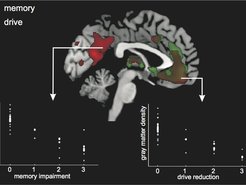Projects
Investigating the aging brain

Before examining pathological processes, one has to understand the normal functioning of the brain. Additionally, one should explore changes during cognitive development and healthy aging. The project addresses these issues by investigating the neural correlates of attention and executive functions during adolescence and aging with optical imaging (functional NIRS) and fMRI. In particular, we apply tests investigating functions of the frontal lobes, for example, the Stroop color word interference and Stop signal task.
Losing your self ...

has been related to the frontal lobes, namely frontomedian regions. This peculiar human ability requires the prediction of mental states and behavior of others, known as “theory of mind” or “mentalizing”. Moreover, self-monitoring, processing/evaluation of internal mental states, perception of pain and emotions, and sustaining personality and self have been associated with frontomedian regions. One dementia syndrome, frontotemporal dementia, is characterized by deep alterations in behavior and personality. We aim to isolate its neural correlates by systematic and quantitative meta-analyses of imaging studies and by investigating MRI and FDG-PET data in our own patient cohort. Indeed, we have been able to demonstrate that frontotemporal dementia specifically affects frontomedian neural networks related to social cognition. Moreover, we dissociated its neural substrates from the substrates of the other two subtypes of frontotemporal lobar degeneration, semantic dementia and progressive non-fluent aphasia, involving mainly language disturbances. Future studies will investigate the neural correlates of executive functions and behavioral deficits in these disorders using MRI and FDG-PET. The project contributes to the placement of the disease in a framework of cognitive neuropsychiatry and may suggest new approaches for therapy. Another frequent disorder is also characterized by alterations of the frontal lobes: Traumatic brain injury. Recently, it was suggested that long term outcomes mainly depend on social cognition. Accordingly, we investigated frontomedian alterations in this disease, namely diffuse axonal injury. We were able to show specific deficits such as inhibition of imitative response tendencies and evaluative judgements in frontomedian tasks using fMRI.
Forgetting your self

This projects aims to characterize the neural correlates of memory. First of all, Alzheimer’s disease and its prodromal stage mild cognitive impairment (MCI) are the focus of this project. We isolated their neural correlates by means of systematic and quantitative meta-analyses of imaging studies. Furthermore, we identified imaging markers predicting the conversion from MCI to Alzheimer’s disease. Now, we are proving hypotheses in our patient cohort with multimodal imaging (MRI & FDG-PET) and in the comprehensive longitudinal study LIFE at the University of Leipzig. This study explores predictors of conversion from MCI to Alzheimer’s disease in a large cohort of approximately 4,000 subjects during a 2.5 year period. Here, we will focus on the importance of social cognition and emotion comprehension for healthy and pathological aging by combining imaging (MRI, optical imaging) and genetic approaches (polymorphisms). Beside Alzheimer’s disease, heart attacks and resuscitation might lead to severe impairments of memory. Accordingly, another project explores the neural correlates of memory and executive/behavioral deficits in these disorders. Likewise, we are investigating neural networks and their interrelations during unconsciousness due to anesthesia.

